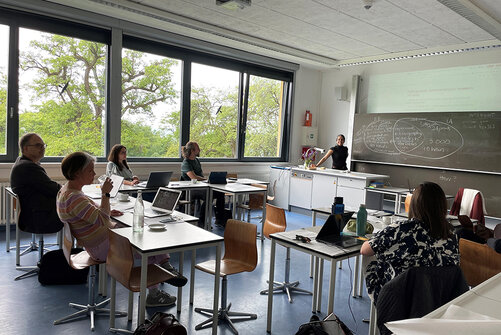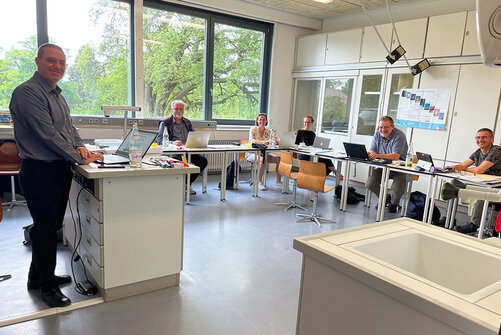One of the defining characteristics of the International Baccalaureate is that they make their own, supranational subject syllabi. This is a long process involving feedback rounds, reports and syllabus drafts. Every IB teacher can be involved when every six or seven years their subject is equipped with a new syllabus.
After a lull due to the pandemic, it was now the turn of all the experimental sciences – the new syllabi for Chemistry, Physics and Biology come into force starting with the new cohort this September and schools around the world are frantically training up their science teachers. At Salem, we joined forces with our ‘friendly schools’ in the region and with the IB to host a ‘cluster workshop’. On May 22 and 23, we ran the three training workshops for these three sciences in our science building, welcoming colleagues from Le Gymnase Jean Sturm (Strasbourg), Frankonian International School (Erlangen), International School Ulm, International School Augsburg and Swiss International School Friedrichshafen. We were guided by outstanding workshop leaders Elisa Jimenez Grant (Chemistry, Geneva), Öykyü Dulun (Biology, Istanbul) and Oscar Eidt (Physics, Qatar).
Working together in small groups and one meta-group to explore the new cross-science collaborative project provided valuable insights, practice opportunity for new syllabus elements and the chance to exchange and build school-to-school contacts to last. Another bonus: two of our new science colleagues could join us and thus future teams could already start working together. Knowing our workshop leaders were travelling on to other cluster workshops in the UK, Norway, Turkey and elsewhere also brought a sense of connectedness to our IB World. After a very full epoch, these two days thus brough us the chance to focus on the core of our work as teachers, already looking ahead to next year.



